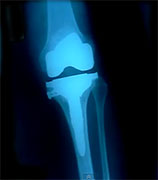
TUESDAY, Nov. 12 (HealthDay News) — Rising rates of obesity among people younger than 65 may be the main reason for the rapidly increasing number of knee replacements in the United States, according to a new study.
The findings dispel the popular belief that aging baby boomers and weekend warriors are behind the unprecedented rise in knee replacement surgeries, the researchers said.
The study authors looked at data from 9,000 knee replacement patients that was gathered by more than 125 orthopedic surgeons from 22 states. The analysis revealed that 55 percent of patients younger than 65 were obese, compared with 43 percent of those who were 65 or older.
Compared with those 65 and older, twice as many of the patients younger than 65 were severely obese (5 percent versus 11 percent, respectively). The younger group of patients also had higher rates of smoking and lower mental health scores, the investigators found.
“What was once thought of as a procedure for older people or those with sporting injuries is changing. Our study shows that younger patients are more obese and experience the same amount of pain and functional disability as older patients and in some cases even more,” study author Dr. David Ayers, director of the Musculoskeletal Center of Excellence at the University of Massachusetts Medical School, said in a university news release.
“What we’re seeing is that the rise in obesity rates in younger people is having a dramatic influence on the number of total joint replacement surgeries. These are not premature or unnecessary procedures,” added Ayers, who is also chair and professor of orthopedics and physical rehabilitation at the medical school, in Worcester, Mass.
The study was presented at a recent meeting of the American College of Rheumatology and the Association of Rheumatology Health Professionals in San Diego. The data and conclusions should be viewed as preliminary until published in a peer-reviewed journal.
Knee replacement surgeries are one of the most common procedures in the United States, with about 600,000 performed each year at a cost of $9.9 billion. The number is expected to grow to 3.48 million procedures a year by 2030.
“Unless we see a significant reduction in obesity, we will continue to see the necessity for more and more of these procedures,” Ayers said.
More information
The American Academy of Orthopaedic Surgeons has more about total knee replacement.
Copyright © 2026 HealthDay. All rights reserved.

